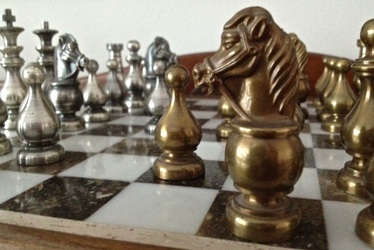
From interviews with Dr. Joseph Juran and his brother Nathan. Nathan (with Richard Day and Thomas Little) won the Academy Award for Best Black-and-White Art Direction – Interior Decoration in 1942 for How Green Was My Valley, directed by John Ford. The interview with Joe Juran was conducted on May 2, 1991, in Wilton, Connecticut. The date for the interview with Nathan is not certain but most probably the summer of 1991.
The interviewer was asking Dr. Juran about his motivation to eliminate errors in the workplace -- but the topic became Dr. Juran’s passion for chess.
QUESTION: Was (your motivation) the end result of eliminating errors, or was it the mental challenge of finding errors?
JOSEPH JURAN: It was the mental challenge. I think that goes back for many years. My way of dealing with challenges . . . Playing little games, I could beat (others) at checkers or whatever. . . I loved to win. I was structured that way and that tended to force me, or lure me, into activities where the analytical mind I had . . . would show up. I'd have then the self-respect that goes with being a winner. I had a bottomless appetite for that sort of thing.
And along came something that made a major change. A neighbor taught me to play chess. Within a matter of weeks he couldn't touch me. He wasn't structured that way, and I was. I was a freshman in college at that time. In my sophomore year I became the college chess champion, and stayed that way the rest of my time.
Now that was a tremendous thing, to me. In world affairs, it's not a big deal to be a college chess champion but to me it was an enormous thing, because in a place like the university, the chess champion has a high status . . . my grades were mediocre. I didn't spend enough time studying, but they looked up to the fact this guy's the college chess champion. The faculty looked up to it.
But this was part of the same thing--here was a game that required a great deal of analysis, and you've got to do in a very short time, and the top chess player can run through many more combinations in a short time mentally than his competitors. Speed is one of the big elements of that although many people don't realize it. I mean they see players sitting there and nobody's moving and cobwebs are starting to collect—they think it's an awfully dull game. If they could watch the pieces move as fast as they're being visualized by the players, there'd be a blur.
NATHAN JURAN: We used to play chess when we slept in the same bed, Joe and I, after the lights were out. We didn't have many lights in those days. But, when the lights were out, and everything was dark, we'd play chess just by visualizing the board and call out the moves, see? But after maybe, six or eight moves, I'd be lost, but Joe knew exactly where every piece was. So he always won.
My Take-Away:
Google “leadership” and “chess” and you may be surprised at the results: Martin Stem’s “The Effects of Chess on Leadership”, Carol Goman’s “Leadership is Like a Game of Chess”, Gregorio Bituin, Jr.’s, Chess and Leadership. Bituin wrote, “A chess player requires making a decisive move in a very complex situation and under time pressure.” These writers draw parallels between the lessons and skills honed playing chess, much like Joseph Juran, and the qualities needed in leaders.
Many academic papers have been written about chess players and how the best may be different, psychologically or physiologically. I have found none that specifically focused on leadership and chess. However, Unterrainer and colleagues reported an experimental study comparing chess players and non-chess players on planning abilities. On measures of intelligence, the chess players and non-chess players were the same. Using the Tower of London cognitive test, they found chess players had superior planning abilities, especially on more difficult problems. They made fewer unnecessary moves on the test.
Stanley Kubrick, the great film director, on chess: “You sit at the board and suddenly your heart leaps. Your hand trembles to pick up the piece and move it. But what chess teaches you is that you must sit there calmly and think about whether it's really a good idea and whether there are other, better ideas.”
Does playing chess make better leaders? An empirical question -- but my guess would be probably so.
Unterrainer, J. M., Kaller, C. P., Halsband, U., & Rahm, B. (2006). Planning abilities and chess: A comparison of chess and non-chess players on the Tower of London task. British Journal of Psychology, 97(3), 299–311
Kubrick quotation from http://www.brainyquote.com/quotes/keywords/chess.html#qGC7Pv5uEFZfxdUk.99
Image of my chess set, a wedding gift from my wife.
 RSS Feed
RSS Feed